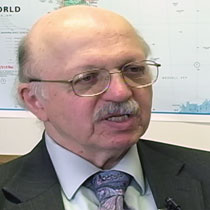
“Without Christians, there would be no Lebanon,” Cargued at a lecture at Boston College on Wednesday. In Lebanon, he said, “Christian leaders have fought to preserve a democratic polity in which all the religious groups would be equal and represented at all levels of government, and in which all basic freedoms would be protected.” In the election of General Michel Aoun as Lebanon’s president last month, ending two years of deadlock in which the office went unfilled, Deeb saw positive signs of a “new dialogue among Lebanese,” and expected that Aoun “will accomplish a lot.”
In his lecture, Professor Deeb traced in detail the history of Christian leadership in Lebanon, from the establishment of Mount Lebanon as an autonomous zone after the massacres of Christians in 1860 to the 1975-1990 Civil War. Deeb argued that the Christians’ desire for a “free and open society” helped preserve Lebanese society despite the horrific violence of the war.
Deeb described President Aoun as a “remarkable man.” He is a Christian who began his career fighting against the Syrian occupation of Lebanon and later aligned himself with Syria’s Shi’ite Muslim ally Hezbollah. In Deeb’s view, the conditions for the election of Aoun as President were made possible by the declining influence in Lebanon of both Shi’ite Iran and Sunni Saudi Arabia. The energy of Iran and its Lebanese proxy, Hezbollah, is being absorbed in Syria, while Saudi Arabia is bogged down in Yemen.
Deeb expects that Aoun can make progress on a number of issues in Lebanon, from reintegrating the exiled South Lebanon Army, to improving relations between Israel, Syria and Lebanon, to fighting corruption and improving basic services. Despite Deeb’s description of Hezbollah as “villains,” he believes Aoun’s relationship with them will help “prevent conflict.” “Christians in the West should be supportive of Lebanon,” Deeb concluded, “and of Michel Aoun in particular.”
Deeb also argued that efforts should be made to restore nationality to Lebanese living abroad, most of whom are Christian. While Christians made up the majority in Lebanon at the time of independence in 1943, their proportion of the population has sharply fallen due to emigration and higher birth rates among Lebanese Muslims. If the diaspora is counted, Deeb noted, “they are at least on par with their Muslim counterparts. To count only the Christians who reside in Lebanon is totally unacceptable.” The Lebanese diaspora, Deeb explained, remains an organic part of Lebanese society.
“Despite the wars and the conflicts that have ravaged their homeland,” Deeb concluded, “the Christians have always rebuilt their country and continue to have faith in a better future. The religious freedom they enjoy is a model for all the Christians of the Levant and Egypt. They ring the bells of their church loudly, and show their symbols in public without fear.” Deeb drew a marked contrast between Lebanon and other states in the region like Egypt, where Christians “are harassed all the time, and their churches are burned,” Qatar, where the only churches were built under diplomatic pressure and have no bells or crosses, and Turkey, where nearly all the Christians were wiped out decades ago.
Marius Deeb is a retired professor at the School of Advanced International Studies at John Hopkins University and the author of Syria’s Terrorist War on Lebanon and the Peace Process. The full video of Deeb’s talk can be seen online at www.middle-east-minorities.com, and was part of a lecture series on The Future of Religious Minorities in the Middle East being held at Boston College, and sponsored by Christian Solidarity International in cooperation with the Department of Slavic & Eastern Languages & Literatures, the Boisi Center for Religion and American Public Life, and the Department of Political Science, Islamic Civilization and Societies.
YAHOO

Leave a Reply
You must be logged in to post a comment.